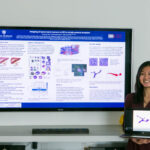INBT director wins “Provocative Questions” grant
Peter Searson, director of Johns Hopkins Institute for NanoBioTechnology, has received a “Provocative Questions” grant from the National Cancer Institute. Among the researchers nationwide who received this award, Searson is one of two at Johns Hopkins University. Searson is the Joseph R. and Lynn C. Reynolds Professor in the Whiting School of Engineering. He is a professor of materials science and engineering and also co-director of the Johns Hopkins Center of Cancer Nanotechnology Excellence.
A press release issued by Johns Hopkins states:
Two Johns Hopkins scientists are among the first recipients of grants geared to answer “Provocative Questions” in cancer research, a new project funded by the National Cancer Institute (NCI), part of the National Institutes of Health (NIH). Cynthia Sears, M.D., and Peter Searson, Ph.D., will receive more than $500,000 combined in the first of five years of funding.
The federally funded “Provocative Questions” project will distribute more than $22 million this year among 57 grant recipients nationwide. Each grant aims to provide answers to one of 24 questions, solicited from the research community, that address neglected or unsolved areas of cancer research.
Sears and Searson’s projects were chosen by a specially-designed peer-review process from among more than 700 applications submitted by scientists.
Sears will receive $236,480 in the first year of funding to examine how and why certain cancers may be caused by infections. An infectious disease expert, Sears has previously linked some colon cancers to common diarrheal bacteria, and her research will further explore how these and other microbes may cause colon cancer. Sears, a professor of medicine and oncology at Johns Hopkins, says these discoveries may help physicians detect earlier those at risk for colon cancer and prevent it more effectively.
With $316,513 in first-year funding, Searson will develop a new method to study how cancer spreads, also known as “metastasis.” He proposes a device with an artificial blood vessel and other cellular components to study the spread of cancer. The “lab-on-a-chip” approach could replicate processes that occur in metastasis and provide a testing ground for experiments with a method easily reproduced by scientists. Searson is the Joseph R. and Lynn C. Reynolds Professor of Materials Science and Engineering and directs the Johns Hopkins Institute for NanoBioTechnology.
Sears’ grant is titled “Microbial Induction of Colon Cancer and Mechanisms” (NIH, NCI grant #R21CA170492-01), and Searson’s is “An engineered platform for the study of metastasis” (NIH, NCI grant #1R01CA170629-01)
Original press release appears here.
Latest Posts
-
 Q&A with PSON Intern Jocelyn Hsu
August 19, 2021
Q&A with PSON Intern Jocelyn Hsu
August 19, 2021
-
 Start Up Founders from Johns Hopkins Aim to Stop Spread of Cancer
August 3, 2021
Start Up Founders from Johns Hopkins Aim to Stop Spread of Cancer
August 3, 2021
-
 Protein Appears to Prevent Tumor Cells from Spreading Via Blood Vessels
July 15, 2021
Protein Appears to Prevent Tumor Cells from Spreading Via Blood Vessels
July 15, 2021


